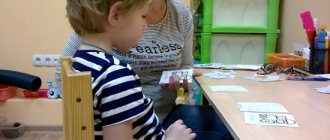Parents' concerns about the normal development of their baby are natural. They often compare his achievements and skills with their own at a similar age. But all children begin to walk and talk at different times. What is considered the norm? And in what case is it necessary to contact a specialist to prevent developmental delays?
In the 21st century, the theory is being promoted that classes with children under one year old do not carry any burden, they are useless. That a child’s capabilities are affected by brain maturation. But that's not true. During an experiment on children of different nationalities and races, American scientists expected that in the absence of communication they would speak a certain metalanguage. That did not happen. The children never spoke. Subsequently, they lagged behind their peers in development.
Deviation from the norm
There are several stages in the gradual formation of children's speech according to WHO standards: from babbling to the ability to compose sentences and conduct a dialogue. First, the baby begins to understand what is happening around. After the end of the preparatory stage, the early period begins (1-3 years). If the child is healthy, there are no neurological symptoms, at this time active speech is already being formed. This means that he watches adults with curiosity and repeats after them. At first, he may confuse or distort letters and words, and use them according to the principle of generalization. This is normal, nothing needs to be done in this case. For example, when saying “kitty,” a baby can mean any action that she is performing at that moment. To describe the situation, he actively uses facial expressions and gestures. At the same time, he can begin to copy animal sounds (moo, meow).
By the end of the first year, words (from 2 to 10 or more) appear in the baby’s everyday life. By the time a child is one year old, the following sounds are available for pronunciation: a, u, i, p, b, m. He already speaks the first words: “mom,” “dad,” “give.” At 1.6 months. the child uses up to 100 words in everyday life and communicates using simple sentences. He may want to speak, but is silent due to insufficient vocabulary.
According to the norms of the Russian Federation, developed by N. M. Shchelovanov, by the first year the baby speaks 10-12 words, their list may differ. Gradually, he moves from repetition to identifying the characteristics of an object, then logical thinking is formed.
What are the consequences of not spending time with your baby?
- violation of the pronunciation of sounds;
- underdevelopment of the organs of the articulatory apparatus;
- difficulties with mastering written speech;
- burr;
- fear of public speaking in adulthood.
Between normality and pathology
No one needs to prove the importance of timely mastery of their native speech. This is a complex, multifaceted process directly related to various mental functions: attention, thinking, memory and speech. They expect the first words from a one-year-old baby, but he cannot even say “dad” and “mama”, he babbles in his own language and is not going to learn new words.
Alarmed parents begin to study family history, turn to doctors for advice and do their best to speed up the speech development of the baby.
A one-year-old child is able to pronounce from 3 to 12 words, but in their structure they are simple, very similar to babbling. Woof-woof, beep-bee, am-am, lalya, give, dad, mom, baba, kitty, na, bang or whoop - this is the approximate vocabulary of children per year.
Each baby is individual - some develop their first word at 8–9 months, and others at 1 year 3 months, and all these are variations of the norm.
Before the appearance of the first word, the speech of a one-year-old child went through a complex path of development. The laws of the formation of children's speech do not change over time. Today, like 100–200 years ago, not a single baby begins to speak in words and sentences until he has gone through all the stages of speech development. These stages are associated with the development of the brain, articulation apparatus and hearing.
No early development method can change the laws of nature, according to which the organs of pronunciation (articulation), hearing and the central nervous system of a person develop.
If you are concerned that your baby speaks poorly, check out the main stages of pre-language development in children under one year of age:
- 1–2 months – the appearance of intonations of pleasure and displeasure in the cry;
- 1.5–3 months – humming or hooting, when children repeat after adults vowels with the sound [g] or pronounce them independently, carefully listening to the sounds they pronounce (agu);
- 4–5 months – babbling, pronunciation of similar words consisting of several identical syllables (ma-ma-ma, but this does not yet mean the word mom);
- 8–9 months – appearance of onomatopoeia (pee-pee, woof-woof) and babbling words (kuka, tata, nanny);
- 11 months – the child uses approximately ten babbling words in the correct context, correlating their pronunciation with the situation (mom, dad, dai, bibi, etc.).
What is considered pathology? It is still too early to make predictions about speech development at one year old, however, you should start to worry if a one-year-old baby does not understand simple verbal instructions that are not supported by gestures. For example, “Give me the ball”, “Show me where the car is”, etc. Lack of response to an adult's words may be a symptom of hearing impairment or its complete absence. In this case, speech stops at the humming stage, because the child has nothing to relate his own babble to.
If urgent measures are not taken at this stage, it will be very difficult to stimulate speech development in the future. It is important to promptly contact an otolaryngologist for a hearing test. Perhaps, in case of pathologies of the inner ear, the doctor will consider it necessary for the child to wear a hearing aid. In case of serious hearing deviations from the norm, this is the only opportunity to develop and maintain speech.
Factors of speech defects
Why is it such a pressing problem in the modern world that a child does not speak at 1 year of age? If there is no history of neurological disease, this may be due to several factors.
The thing is that young children are not able to isolate individual words from a stream of speech. It is like the sound of a waterfall. Despite the abundance of audiobooks and special educational programs on TV, other exercises are also necessary to promote speech development. Parents spend less and less time with their children playing speech games: “Magpie-Crow”, “Ladushki”, nursery rhymes. They are optimal for a one-year-old baby; they teach him to imitate sounds.
There are even special terms for silent children: “Mowgli”, “hospitalism”. They are healthy, but do not have the opportunity to communicate with loved ones because they are not there. Since the mother spends more time with the child, her communication with him is of great importance and contributes to the development of the speech structures of the brain.
When should you sound the alarm?
You should really worry if:
- the child does not show interest in the world around him;
- he does not recognize mom and dad, family members living with him;
- there are severe hereditary pathologies in the family;
- the baby does not know his name, does not respond to speech and sounds;
- his fine and gross motor skills are not developed, for example, he cannot pick up a toy;
- the child does not respond to adult speech and does not fulfill simple requests;
- There are risk factors - difficult childbirth, difficult pregnancy, central nervous system pathologies, hearing and vision impairment.
Experts identify the following reasons for the lack of speech at one year of age.
- Difficult pregnancy, difficult childbirth, intrauterine infections, maternal use of certain medications, alcohol, illegal substances - all this can cause disturbances in the functioning of the central nervous system.
- Pathologies of hearing and vision - if the child does not see or hear the world around him, it is difficult to expect any response.
- Pacifier obsession: If the mouth is constantly busy, the baby will communicate with parents using gestures and mooing. There is simply no need for articulate speech.
- Pedagogical neglect: a child should be taught to speak from the first days of life, so that he knows how speech is created and sounds.
- The other extreme is the baby’s overload. Many parents begin to work intensively with their child from birth and literally demand his first words. Silence in this case is an expression of protest.
- If several languages are used in the family at the same time, then the child needs some time to figure out which one he should learn to speak.
Reasons for lack of speech
Don’t immediately panic if your child doesn’t speak a word for a year. Before you consult a speech therapist or neurologist, or buy vitamin supplements, pay attention to the conditions in which it grows.
How quickly the reserve of active speech equals or exceeds passive speech depends on the baby’s immediate environment. It is useless to force him to repeat words; there must be a connection between the object and the action. This is what folk songs and nursery rhymes are based on.
According to statistics, children from orphanages who are deprived of parental attention most often face the problem of lack of speech or delayed speech development.
The pacifier prevents the baby from concentrating; he becomes isolated in his own feelings. If you use it for a long time, there is a risk that your speech will be slurred and your bite will be disrupted.
Another factor influencing late speech development is multiple pregnancy. When there are two or three children, for a long time they prefer to communicate with each other in a language they understand. The way out of this situation is to alternately do different things with them, while one is fed, read to, and play with the other.
Stress can also discourage communication. Moving, parental divorce, or the arrival of a new family member requires adaptation. Only in a calm and comfortable environment will the baby be happy and develop fully on time.
Genetics also plays a role in development. The child may be predisposed to late speech development. But this does not mean that you don’t need to work with him; he himself will not speak in any case.
The well-known fact that girls mature earlier than boys is also true. Despite this, the stronger sex subsequently learns to compose sentences faster, because the ability to realize actions and movements is better developed in them. And girls perceive information through the names of objects.
Temperament type influences when children begin to speak. If they are active and inquisitive fidgets, then the world will be learned faster. A calm baby may prefer to limit his space to a crib and a favorite toy.
Therefore, recommendations for correcting the condition cannot be the same. Observe your child and select her methods intuitively. Remember that learning should take place in a comfortable and fun environment.
Year two
At the beginning of the 2nd year of life, the child begins to copy the speech of others and his vocabulary rapidly expands: by the age of 1.5 years it is about 50 words. The baby already pronounces, albeit not always clearly, almost all vowels and some consonant sounds: [d], [t], [b], [p], [k], [g], [m], [n], [x], [f], [v]. In this case, hard consonants can be pronounced as paired soft ones (“dai” - “dyai”), and full “versions” of words are replaced by onomatopoeias (“chicken” - “ko-ko”, “cat” - “meow”) or “truncated” up to 1-2 syllable variations (“cube” - “ku”, “dog” - “baka”). At the same time, the first proposals begin to appear. Speech becomes more meaningful, gradually replacing facial reactions and gestures.
By the age of two, a child’s active vocabulary already contains up to 400 nouns and verbs, from which he learns to construct simple sentences (of 3-4 or more words). The baby correctly pronounces all vowel sounds and the lightest consonants; interrogative and exclamatory intonation already appears in his speech. The correct pronunciation of sounds often depends on their location in the word: in 2-syllable words with open syllables, all sounds are pronounced correctly, but in more complex words, the baby can replace or skip individual sounds or entire syllables. Words that contain 2 or more consonants in a row also cause difficulty. At the same time, correct sound pronunciation is not constant: one time the baby can pronounce a sound correctly, and the next time - incorrectly. This is quite normal for this age.
Correction of speech impediments
First, it is necessary to exclude hearing pathology. Notice whether the child responds to his name or when a request is made to him. If organ defects are detected, the cause must be eliminated.
There is no single approach to treating such a deviation. What is needed here is the principle of daily accumulation of passive vocabulary. The baby will be interested in playing with his parents, listening to fairy tales, and singing songs. The ability to control voice intonation and the clarity of pronunciation of words and sounds is of great importance. For example, look at pictures together, accompanying the story with a description of the object.
To quickly get rid of “bi-bi”, “kach-kach”, pronounce the whole word. While walking in the fresh air, you can read to your child A. Barto, K. Chukovsky. Surround your child with attention and care, creating conditions favorable for the formation of speech. There should be no overprotection, he should have a need for communication.
You shouldn’t give up educational toys; those designed for developing fine motor skills will be especially useful. You can also build such devices yourself using a master class from the Internet.
Patience is the key to success
Speech development is not a momentary process. It can be gently stimulated, but cannot be pushed. Even if your desire to hear the first words as soon as possible is very great, you should not allow irritation and dissatisfaction towards the baby.
If you manage to switch from achieving the goal to the process itself and doing it with pleasure, you will see, or rather, hear, the result much faster than you expect. This always happens.
We can only wish your today’s quiet person to become an eloquent and sincere person in communication.
How to create a favorable speech environment at home
Play audio recordings with children's jokes. Limit your time in front of the TV. The development of speech skills is facilitated by maintaining a dialogue with the baby; write stories together. You will be a role model for him, your facial expressions, gestures, intonation. Gradually replace incomplete words with correct and adult ones. First repeat the syllables, then use sentences.
By putting your child in front of a modern gadget, you will only harm your child. It will be useful and interesting to visit the zoo with him, where he will get to know the animals. This will certainly cause a storm of emotions. If your baby is lazy to talk, motivate him to do so. For example, he asks with a gesture or the word “Give” a toy, ask what it is, what it’s called or what it does.
Don't overload your baby. At this age, his concentration will not last long, maximum 10-15 minutes. Give preference not to fashionable methods, but to what he likes. This can only be determined experimentally.










